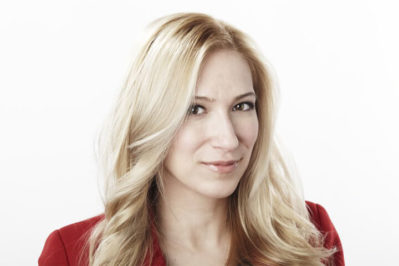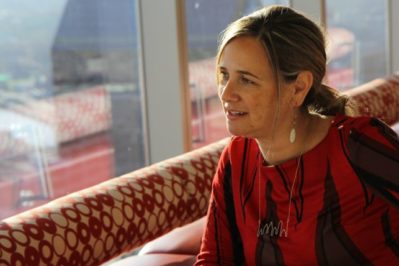For established firms to maintain their agility, it helps to adopt a smart partnership and acquisition strategy. In this episode of Mastering Innovation on Sirius XM Channel 132, Business Radio Powered by The Wharton School, guests Danielle Cohn and Maya Baratz of Comcast discuss how the company looks at startups’ founding teams to ensure they invest in the right fit.
Comcast NBCUniversal LIFT Labs Accelerator, powered by TechStars, is a new program for startups that focus on product innovation in media, entertainment, and connectivity. Cohn and Baratz shared their experiences and challenges working with both incumbents like Comcast and entrepreneurs in the accelerator. To identify successful opportunities, they aim to find product-market and business process fits between the larger organization and the startups. The biggest factors are ultimately the strength of the founding team and how well their goals align with Comcast’s. Baratz also underlined the importance of actively seeking out founders from diverse backgrounds to ensure that no potential source of innovation is overlooked.
An excerpt of the interview is transcribed below. Listen to more episodes here.
Transcript

Maya Baratz: Before I began working at TechStars, I was working in both startups and in larger organizations. I ran new product development at Disney’s ABC News. When I wasn’t building new products, I was always on the lookout for interesting new solutions to problems that we were seeing. I was very much in the middle of that equation of trying to figure out how to best connect the dots between an early stage company and the larger company which obviously had very different timelines, goals, and methodologies for achieving those goals.
What I found was that there is definitely a formula that works. In each company, it’s a little bit different. Sometimes, it depends a lot on the company that you bring in, how coachable they are, and whether or not their product is fluid enough to be massaged for mass consumption, but finding the right companies and the right teams at the right time is really important. What we say at TechStars is, we decide what companies to bring in on a number of different factors, but the biggest factor is the team itself because we see that companies can change over time.
Many companies that are very successful end up changing and pivoting many times before they become what you recognize in front of a firm mass audience. The one consistent thing is the founders. Investing and bringing in the right types of founders usually has a lot to do with whether or not there is great potential for true product-market fit and for a true fit with the larger company.
“Investing and bringing in the right types of founders usually has a lot to do with whether or not there is great potential for true product-market fit.” – Maya Baratz
Saikat Chaudhuri: Maya, let me stick with you for a minute. Let’s take that further. Let’s say you have a startup. You’re promoting it, it’s doing really well, and it’s of interest to Comcast. How do you then make the connections so that Comcast can benefit directly or indirectly?
Baratz: It’s a great question. You have to have a true partnership for that to work. If a company looks interesting to us, and we’d like to bring it into the cohort, obviously, we’d want to make sure that it’s a company that would be very warmly received in Comcast and that it’s a company that would fit, not just with the business goals, but with the business units within the company. We wanted to make sure that there is a potential for true product-market fit in there to make sure that that would work.
It’s really a hand-in-hand type of partnership that wouldn’t work any other way. It’s really making sure that everyone’s goals are aligned. I always go for the triple win. It has to be a win for TechStars, it needs to be a win for Comcast, and then, most importantly, it needs to be a win for the founders that we’re investing in and bringing into our fold.
Danielle Cohn: Just to add on to that: what we have been doing for the last year is meeting with business leads from our end across the whole company to ask them what focus areas they’re really looking for innovation in. We were able, through that process, to identify five core areas: connected life, next-generation marketing, entertainment everywhere, digital wellness, and smart places. Through that process, we were able to identify subject matter experts, mentors, and champions in the company. At the same time, while we’re looking for things in those focus areas, we’ve also been working with Maya to see if there’s a moonshot, something that isn’t necessarily in one of those defined focus areas, that she believes is really exciting for us to look at. We’re really open to that as well. That’s a wildcard, and we’re really open to those, too, because sometimes, you don’t know what you don’t know.

Chaudhuri: Danielle, that’s where I was actually headed with my next question, which is how you make the connection on your end. Also, what’s the end goal here? I have to ask this. I’m a scholar who has looked at tech acquisitions for many years. Are you looking to, for instance, acquire these startups, have partnerships, or invest in them further? Is there any end goal, or do you take it on a case-by-case basis?
Cohn: It’s all a case-by-case basis, and each company is so different. Some are going to change during the time that they’re here for Techstars and pivot. Some come in and may stay the course, some may fail, and some may succeed.
We are looking at it from many different ways, but I’d say all of the above. We don’t necessarily have one end game. What we have committed to is putting the founders first and giving them the support that they need, so that they can thrive in this program. We’re going to commit to spending time with them, giving them access to business leads for feedback, and being willing to amplify their story, which is what we are probably best at. We can help to home in a little bit on their story, help them pitch their stories, and amplify those stories to many, many people through our very vast network. I think for us, there is no one thing. Our primary goal, though, has been product innovation.
Chaudhuri: Sure.
Cohn: We have that at the center and core. We know that if we commit to that with the founders, we will have great partnerships, and some may last a lifetime. That’s what we’re hoping for.
Chaudhuri: There’s one thing that I wanted to get to because it’s an important topic these days, which is women in tech and innovation. Clearly, both of you represent that. We know from science that there’s a lot of evidence that diversity of various kinds, including gender, improves innovation and entrepreneurship outcomes. People may not all accept that, but I think that’s well established out there. Now, there’s a lot more debate though, on how to actually bring women into tech and provide an environment in organizations to make sure that diversity is brought in. What can organizations do to promote more women in innovation and entrepreneurship? Perhaps, Maya, we’ll start with you, and then Danielle after that.
Baratz: Sure, absolutely. Making sure that we are well-representing founders in the full spectrum of their backgrounds and interests – whether they are women of color or coming from a different economic background – is really important to TechStars. I know that it’s really important in this particular partnership as well. There are many different ways. I don’t believe there is one singular answer. What I do know is that you have to be very proactive about making sure you bring in the full spectrum of founders that you would like to see.
“To build the truly most successful companies that will be inclusive, with products and business that are inclusive, you need to start with the founders.” – Maya Baratz
Some other things that we’ve done in recruiting companies for this particular program is, we’ve gone out of our way to do things like host a women founders’ brunch and women investor panel at South by Southwest. We’ve gone to Black Tech Week. We’re going out to the places that we think we’re going to find really strong potential leaders that come from any background. That’s really important to us because we know that to build the truly most successful companies that will be inclusive, with products and business that are inclusive, you need to start with the founders. You need to start with the founders that truly represent a full spectrum of inclusivity. It’s really important and top of mind for us, as we’re from the very bottom up as we’re building these companies.
About Our Guests
Maya Baratz is the Managing Director of Comcast NBCUniversal LIFT Labs Accelerator, Powered by Techstars, through which she actively invests in media and connectivity companies. Baratz is a longtime startup advisor and a recent Harvard University Nieman Fellow with a deep footing in and passion for consumer products. She has led the strategy and development of new-to-market digital products and revenue streams, most recently as the Head of New Products at Disney/ABC News and, prior to that, as a product and media executive for companies including The Wall Street Journal, MTV, Flickr and Monster.com. Baratz has also written extensively about technology and startups for publications including Fortune, Fast Company, Newsweek, and The Wall Street Journal, among others. She has created and led a product development course at institutions including Columbia Business School and General Assembly. She can be reached @mbaratz on Twitter.
Danielle Cohn is the Senior Director for Entrepreneurial Engagement at Comcast. She is responsible for curating and celebrating Comcast’s spirit of entrepreneurship by building more awareness of the many programs and resources throughout the company that foster innovation in the communities that Comcast serves. Cohn directs Comcast’s ongoing engagement with and support of startups, incubators, co-working spaces, investors and individual entrepreneurs, as well as programs that inspire current and potential Comcast and NBCUniversal talent. Using Comcast’s power to do good, Cohn works company wide to provide entrepreneurs with access to the internal and external network of one of the fastest growing technology and innovation companies in the world, once a small Philadelphia startup itself.
Mastering Innovation is live on Thursdays at 4:00 p.m. ET. Listen to more episodes here.




Superb article. I would like to share it on my Twitter. Can I?
Thanks – feel free!